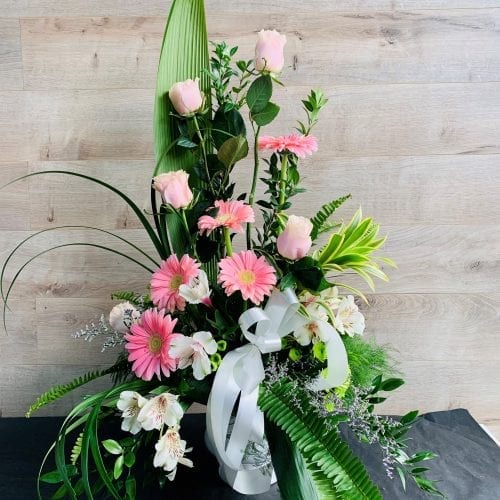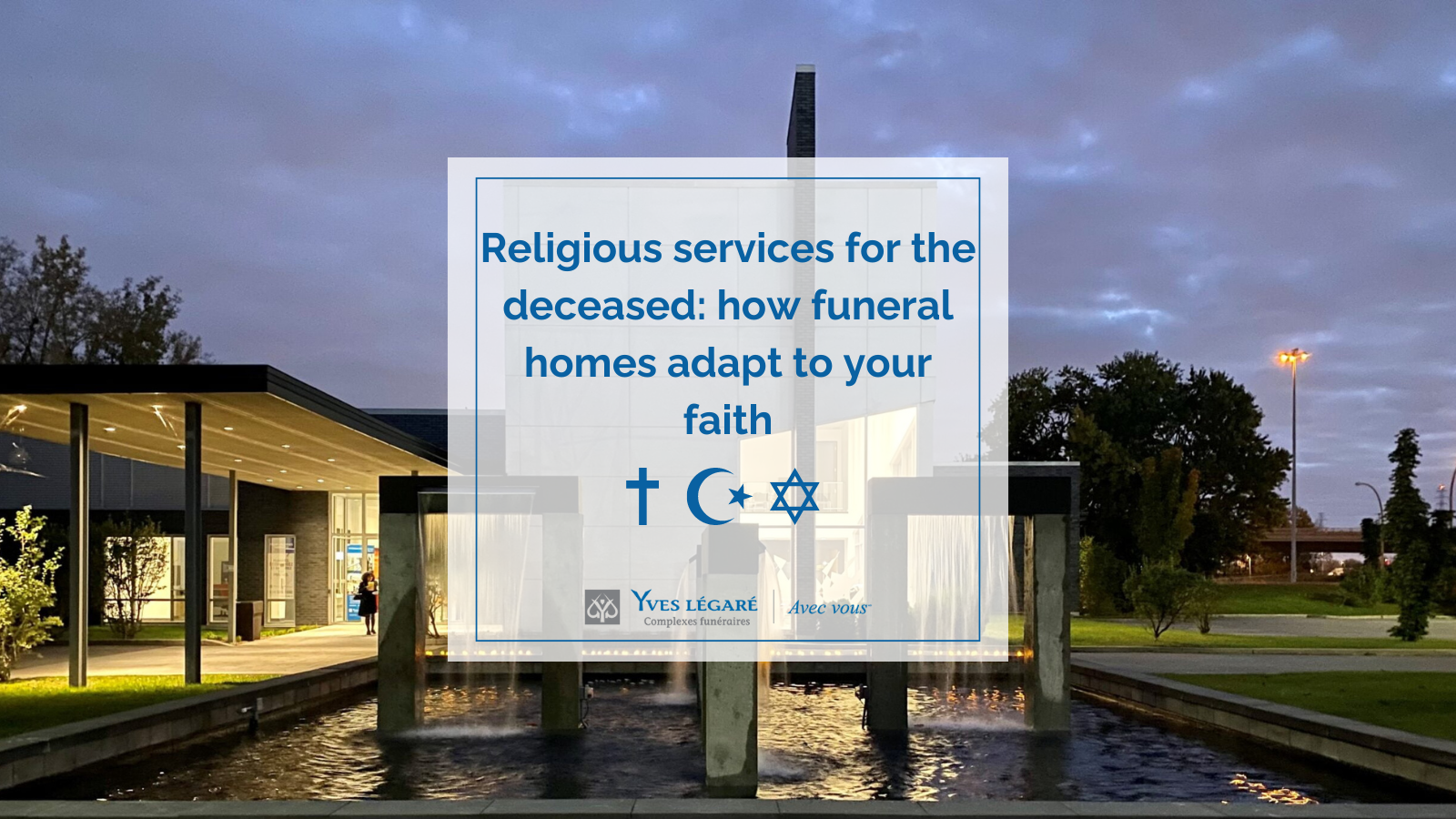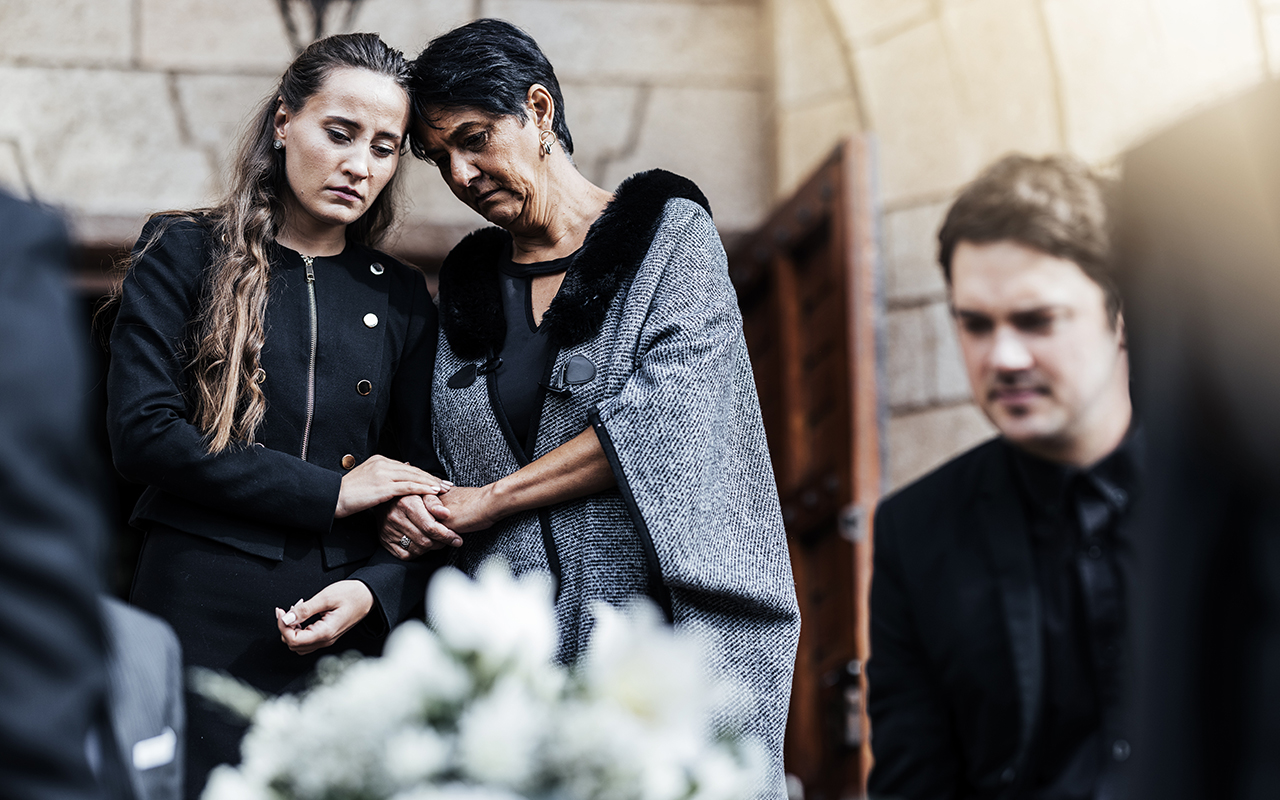Laval Funeral Homes | FAQ
Laval Funeral Homes | A Practical Frequently Asked Questions Section (FAQ)
Consult it as necessary in order to better understand our Laval funeral homes, find useful information.
After a loved one has deceased, it is required to order a certificate or a copy of the act of death from the Quebec’s Register of Civil Status (Directeur de l’état civil). These are the only official documents which will serve as proofs of death.
The application may be made by mail, in person or by completing the online application form available on the website of Quebec’s Register of Civil Status (Directeur de l’état civil).
- Note:
This procedure may be initiated when the funeral arrangements are made, i.e., when filling out the declaration of death online with your counselor. The advantage of doing so is that you will accelerate the process of updating the register of civil status and thereby more quickly receive the copy of the act of death or death certificate.

No matter if a loved one’s passing has been expected for some time or happens out of the blue, death always sparks many intense emotions ‒and also along list of steps to follow. Are you unsure of what to do if a loved one dies? Yves Légaré guides you and explains the different steps to follow. Our counselors are here to help you plan with as much peace of mind as possible, for a last tribute to the one who is gone.
Where to begin?
A loved one’s passing stirs up very painful emotions. Feeling distraught or completely exhausted at the thought of having to tackle all of the different administrative procedures is perfectly normal.
Some steps have to be completed fairly quickly; they include obtaining the death certificate. You will then have to contact different services and individuals, like the SAAQ to cancel the driver’s license, or other services (phone, television, etc.). It is also recommended that you contact your loved one’s notary to book an appointment, within 15 days of their passing.
We know that you will have many things to do and to think about. Our Yves Légaré funeral complexes, located in Laval, Montreal and Pierrefonds, bring you the support you need. We offer much more than funeral services: we are also here to guide you when the time comes for the legal documents, in order to help make the transition more peaceful and help you figure out what to do if your loved one has passed.
Step 1: Funeral prearrangement contract
One of the first things you should do before planning a funeral of any kind, is to verify if there were any funeral prearrangements made. Your loved one might have already mentioned if they had a funeral prearrangement contract. You might also have seen wallet-sized cards informing you of the existence of a contract and the funeral home’s contact details.
If your loved one had never mentioned prearrangements, we can now check if these exist. A registry for funeral prearrangement contracts was established in 2021, and includes all prearranged contracts, even those completed prior to that year. It also includes funeral services and pre-purchased burial plot contracts.
Companies are the only ones to have access to the registry. You can ask our team to verify this information for you; we will provide you with a document that proves that we have obtained the information from the registry.
If you do not find any preexisting contracts, you will then have to plan for the funeral arrangements yourself.
Did your loved have a prearrangement contract with one of our Yves Légaré Complexes?
When someone signs a funeral prearrangement contract with Yves Légaré Funeral Complexes, we issue wallet cards or pocket-sized cards to inform loved ones of the existence of the contract.
This way, the cards can be kept in your loved one’s wallet, alongside their other identity cards.
On top of the funeral home’s detailed contact information, this card also includes the contract holder’s name along with the contact information and name of the people to contact in the event of their passing; a copy of this card can be given to them by the contract holder as well.
Step 2: Management and Responsibilities
What were the deceased’s last wishes?
To honour your loved one’s memory, it is important to respect their last wishes. The deceased might prefer cremation or a burial, for example, or to donate their body to science, or want to be an organ donor.
Has your loved one ever mentioned any preferences regarding the items of clothing they should wear for the viewing? A special song to be played at the ceremony or the funeral home? Or perhaps they had special demands when it comes to the ceremony itself of what to do with their ashes?
No matter what the deceased’s last wishes were, we offer different funeral ceremonies that are adapted to your budget and preferences.
Who is responsible for the funeral arrangements?
That will depend on if this is mentioned in the will or not. The deceased might give this responsibility over to the liquidator (testamentary executor). If this is not the case, the heirs will then have to share the responsibility.
Who will cover the costs?
Costs are covered by the inheritance or heirs; you might be reimbursed if you had to pay out of pocket. Moreover, you may have access to a death benefit if the deceased had sufficiently contributed to the Quebec Pension Plan. You may receive a lump sum of up to $ 2,500.
Step 3: Contact a funeral complex
If the death occurs in Canada
If your loved one dies in Canada, even if it outside of the province of Quebec, contact our funeral complexes so that we can help you plan for the body to be transported here. If your loved one passed in their home, start by contacting 9-1-1 so that you can obtain an Attestation of Death from an emergency medicine doctor.
You should then book an appointment with us so that you can plan for customized funeral services.
If the death happens outside of Canada
Going through the loss of a loved one is a very difficult time, which can become even more stressful if the death occurs outside of the country, in which case there are different procedures to follow. For greater peace of mind during a difficult time, contact our international repatriation service, free of charge.

Step 4: Administrative and legal procedures
There are necessary formalities that must be followed in the event of a death. Here are the documents you will need:
- An Attestation of Death, which will be given to you by the funeral service company.
- The Death Certificate, given to you by the Directeur de l’état civil. You can obtain this certificate by filling an application online, by sending it via regular mail or by visiting their offices in person.
- A marriage contract or civil union contract if applicable. You can ask your notary for a copy, if needed.
- A divorce certificate or judgement of legal separation if applicable. You can contact the Clerk’s Office of the Superior Court or the local courthouse where the judgement was filed.
- All pertinent documents for the inheritance: bank statements, insurance contracts, investment certificates, etc. You will have to contact the financial institutions where the deceased had bank accounts.
What documents do I need to have with me, during my first meeting with the counselor?
During this meeting, you will need to provide your counselor with the deceased’s following personal belongings and information:
- Health insurance card
- Social insurance number
- Driver’s license number (if applicable)
- The funeral prearrangement contract (if applicable)
- The sepulchre contract (if applicable)
- The life insurance policy (if applicable)
- The deceased’s address
- The date and place of their birth
- First and last name of both their parents (including the mother’s maiden name)
- A recent picture for the thanatopraxia, the newspaper obituary, and printing materials (bookmarks and thank you cards)
This information will help your counselor fill the Declaration of Death (DEC-100 form) that will then be sent to the Directeur de l’état civil.
Step 5: Dealing with grief
When people wonder about what to do if a loved one passes, they often think of formalities; but taking proper time to grieve and for self-care is another step that should not be overlooked.
Losing a loved one can cause a cascade of emotions, from acute emotional pain to intense anger, and mood swings, stress or a feeling of emptiness, or even the complete absence of emotions. Each person grieves differently.
Finding the right strategies to help you adapt, exchange with others and identify the right people for support, are all ways that can help you move through your grief more easily. Try to maintain healthy life habits as well.
If you feel the need, you should not hesitate to contact a psychologist or other free resources:
- Tel-Écoute – Ligne D’écoute Le Deuil, for people who have lost a loved one: 1 888 533-3845
- Deuil-Jeunesse (professional intervention for youth and families grieving a loved one): 1 855 889-3666
- Info-Social 811, option 2
FAQ – Frequently Asked Questions
How can I prepare, in the event of imminent death?
Contact us as soon as possible; a counselor will be able to guide you through every step of the process.
What to do if your loved one passes in a hospital or CHSLD?
If you agree, the establishment can communicate with us directly to arrange for transportation of the deceased directly to our funeral home.
You can then book an appointment with one of our counselors to choose funeral arrangements (you should plan for around 3 hours).
What to do if your loved one dies at home?
You should dial 9-1-1 immediately. An Attestation of Death will then be provided to you by an emergency medicine doctor.
Once papers have been completed, contact us so that we can quickly proceed to having the deceased moved directly to our funeral home.
You can then book an appointment with one of our counselors to choose funeral arrangements (you should expect a meeting of around 3 hours).
What to do if your loved one passes on while abroad?
Contact our toll-free number: 1 800 454-8767. Our international repatriation service will begin the necessary administrative steps and process with the legal authorities in the country where the death has occurred, as soon as possible, in order to have the body or ashes repatriated.
What to prepare for a viewing?
You will have to bring the deceased’s following personal belongings:
- Clothing (long sleeves and close to the neck)
- Underwear
- Shoes (optional)
- Glasses and case
- Jewelry or any other significant objects like a rosary, etc.
- Hair dye
- Makeup
- Dental prosthesis and container

The following links may prove useful to plan a funeral or liquidate an estate.
Funeral planning
What to do in the event of Death?
Follow this link to obtain a copy of the What to Do in the Event of Death? guide published by the Québec government. This guide provides an overview of the steps to be taken following a death. It also gives you access to “My personalized itinerary” for a customized list of steps to take depending on the deceased’s specific situation.
List of government agencies and departments to contact
Get information on the procedures for cancelling the deceased’s various benefits, including Old Age Security, employment insurance benefits, income tax credits, etc.
Directeur de l’État civil du Québec
Declaring a death
Revenu Québec
Service Canada
Canada Revenue Agency
Régie de l’assurance maladie du Québec
Death benefits and pensions
Retraite Québec/Régie des rentes du Québec (RRQ)
Société de l’assurance automobile Québec (SAAQ)
Commission des normes, de l’équité, de la santé et de la sécurité du travail (CNESST)
Indemnisation des victimes d’actes criminels (IVAC)
Ministère du Travail, de l’Emploi et Solidarité sociale du Québec (MESS)
Services Québec (Special Benefit for Funeral Expenses)
Veterans Affairs Canada (Last Post Fund)
Prearrangements (Prearranged Funeral Services Contracts)
Other useful links
Directeur de l’État civil du Québec (To order certificates and copies of acts)
Chambre des notaires du Québec (To seach a will and a mandate in case of incapacity)
Barreau du Québec (To search a will and a mandate in case of incapacity)
Registre des droits personnels et réels mobiliers (RDPRM)
Office de la protection du consommateur du Québec
Canadian Life and Health Insurance Association Inc.
Royal Canadian Mounted Police (What to do with inherated firearms)
Ordre des évaluateurs agréés du Québec
Ordre des comptables professionnels agréés du Québec
Vocabulary in the Funeral Industry
A little vocabulary…
Aquamation: Process consisting of dissolving body tissue in water as opposed to cremation. The solid remains are then reduced to ashes or placed in an urn that may be buried in a cemetery or kept in a columbarium.
Cemetery: A place of burial for human remains.
Cinerary urn vault: A vault for one or several cinerary urns installed in the ground.
Columbarium: An indoor or outdoor vault lined with niches for one or several cinerary urns.
Concession: The right to be interred in a cemetery’s burial site, a mausoleum or a columbarium (plot, niche, cinerary urn vault or crypt).
Concessionaire: An individual who holds the rights conferred by a concession.
Cremation: Act of reducing human remains to ashes by burning them. The ashes are then kept in an urn that can be buried in a cemetery, placed in a columbarium or retained by relatives.
Crematorium: A place where cremations are performed.
Crypt: A recess in a wall designed for one casket containing the remains of a deceased person.
Embalmment (Thanatopraxy): Art and science of preserving human remains by treating them to forestall decomposition, in order to keep them suitable for public display at a funeral.
Grave: An excavation for burial of a body or ashes located in a cemetery.
Mausoleum: A funerary building containing crypts and a columbarium containing niches and, if applicable, cinerary urn vaults.
Niche: A space in a columbarium designed for one or several cinerary urns.
Plot: Site devoted to the burial of bodies or ashes in a cemetery.
Reliquary: Receptacle designed to contain part of the ashes of a deceased.
Sepulture: A place where human remains are placed (plot, niche, cinerary urn vault or crypt).
A bit of vocabulary: Proofs of death
Attestation of cremation: The attestation of cremation confirms that the crematorium has cremated the remains of the deceased. This document may be required before proceeding with a burial or for repatriation.
Attestation of death: Document issued by a funeral home confirming the death of a person. The attestation issued by a funeral home has no legal value, but can however be accepted by third parties in the settlement of the estate. Not to be confused with the attestation delivered by the Directeur de l’état civil du Québec which confirms the presence or absence in the Québec register of civil status of an act of death or a notation made in such act.
Copy of an act of death/Death certificate: Documents issued by the Directeur de l’état civil du Québec serving as a proof of death. They are the only two documents that can serve has a legal proof of death in Québec.
Declaration of death (DEC-100): The declaration of death is a form that is completed by a close relative of the deceased and the funeral director. It provides information about the deceased, the spouse of the deceased and the disposal of the body.
The Declaration of death and the Attestation of death (DEC-101), are used to declare the death of a person to the Directeur de l’état civil du Québec in order for him to issue proofs of death (Copy of an act of death and Death certificate).
FORM SP-3: Return of death (SP-3) and Attestation of death (DEC-101): The Return of death (SP-3) and the Attestation of death (DEC-101) are the two documents included in the Form SP-3. This form is completed by the physician who attests the death in order to establish the identity of the deceased as well as the causes and circumstances of his death.
Because of their confidential nature, causes and circumstances of death can only be disclosed to specific actors (medical file, funeral director and Institut de la statistique du Québec) and will only appear on the Return of death form (SP-3).
As to the Attestation of death (DEC-101), a copy will be given to the declarant of the death with the Declaration of death (DEC-100) and the other will be used by the Directeur de l’état civil to enter the death in the Québec register of civil status.
If the deceased contributed sufficiently to the Québec Pension Plan, three forms of death benefits may be available
Death benefit
The death benefit is a lump sum of a maximum amount of $2,500 which is paid in priority to the person who paid for funeral expenses or to the heirs and, in certain circumstances, to the deceased’s descendants and their surviving spouse.
Surviving spouse’s pension
If you qualify as the surviving spouse, you may also be eligible for a surviving spouse’s pension.
Orphan’s pension
An orphan’s pension may be paid if the deceased was the parent of an underage child or was providing financial support for an underage child for at least one year.
- Note:
Your Complexes funéraires Yves Légaré counselor will complete the survivor’s pension application with you.
The information presented on this page is of a general nature and does not cover the full array of possible situations. For more information on this, visit the website of Retraite Québec or consult your legal advisor.
There are multiple steps involved in settling an Estate.
The importance of consulting a professional
Each Estate has its own particularities. It is therefore recommended to consult a notary of your choice or a lawyer who is qualified in the matters of Estate settlement. This professional will be able to guide you through the process and draft the various legal documents required.
Will searches
To find out if the deceased left a will, start by searching through his or her personal papers. Also, verify if the deceased had a safety deposit box in a financial institution where he or she may have kept his or her will.
Applications for will search certificates
Regardless of whether you are convinced that the deceased did not make a will or are certain that you are in possession of the deceased’s most recent will, you will still need to have a will search conducted at the Chambre des notaires du Québec and the Barreau du Québec in order to obtain the required search certificates.
These two certificates will confirm the existence of a last will made before a notary or drafted by a lawyer.
You can undertake these searches yourself. However, if you wish to receive the results more quickly, the notary or lawyer of your choice may carry out the searches for you.
For more information on this, click on the following links:
The role of the liquidator
The liquidator is the person whose mandate is to liquidate the Estate.
If the deceased had made a will before a notary, a liquidator is usually appointed in the will. If no liquidator has been appointed in a will, the heirs will need to appoint one or liquidate the Estate together.
Steps involved in the liquidation of a succession
Each Estate is unique and will be liquidated differently, according to the deceased’s patrimony and family relationships.
The following steps are usually involved in the liquidation of a succession Estate:
- Obtain the will search certificates and a copy of the deceased’s last will, if applicable;
- Issue the various notices of death (to government authorities, service providers, etc.);
- Draft an Estate inventory;
- Retrieve the deceased’s assets;
- Pay off the deceased’s liabilities as well as those born from their Estate;
- Close the deceased’s utility accounts and terminate his memberships (telephone, electricity, etc.);
- Prepare the income tax returns and obtain the clearance certificates from tax authorities;
- Distribute the net assets of the succession;
- Present a final rendering of account and have it approved by the heirs.
About Yves Légaré Funeral Complexes
With you… Grieving is a profoundly intimate experience. That’s why our funeral homes in Montreal, Laval and the South Shore offer everything you need in time of grief. We can share our pain with others; however, depending on our beliefs, traditions and memories, the process always takes on a profoundly personal meaning. Yves Légaré Funeral Complexes mission is to make things easier for you to pay a final tribute to your loved one in a respectful and dignified setting. Our experienced funeral counselors and professionals such as executor of will provide a one-of-a-kind funeral counseling service. It is important for us to help you get through this difficult time.
Information Request
PERSONAL INFORMATION PROTECTION POLICY
Our website does not store any of the information communicated during a session. Your name and contact details are not stored on our servers.
However, if you make comments by e-mail, we reserve the right to collect this information for follow-up purposes. This information will not be shared with third parties, and you may request that it be removed from our archives at any time by contacting:
Tomasz Hlywa: thlywa@yveslegare.com
Phone: 514 595-1500












